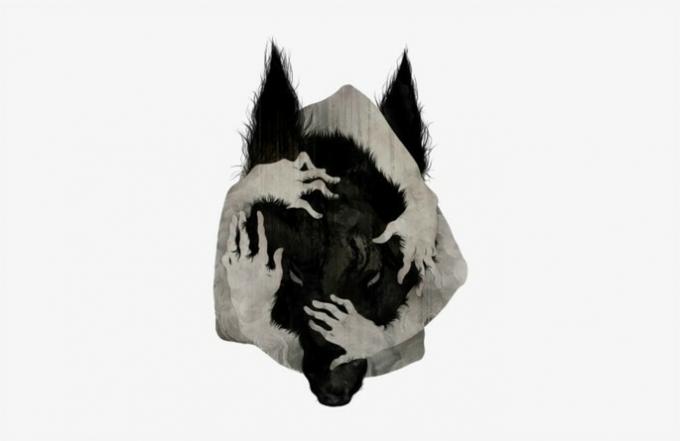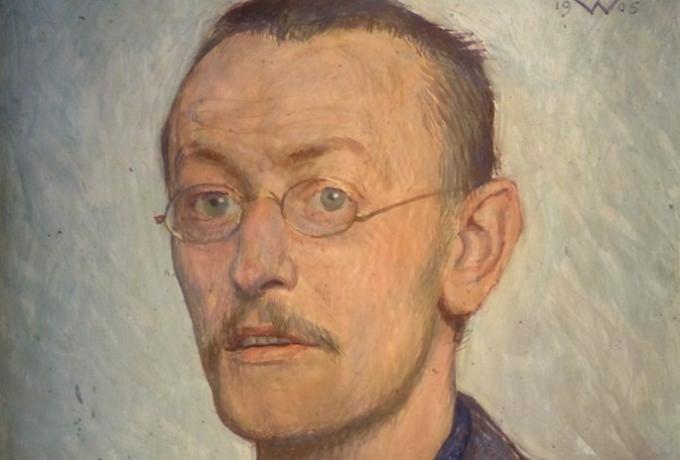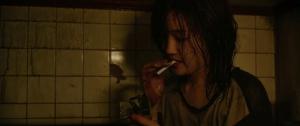The steppe wolf of Hermann Hesse: analysis, summary and characters of the book
Steppe wolf (1927) is one of the most popular works of Hermann Hesse. It is about the double nature of the hero, between human and wolf, which condemns the protagonist to a disturbed existence.
The book is based in part on the biography of Hermann Hesse, who struggled with depression throughout his life. It was written in a time of isolation and loneliness, during a period of crisis, when the author was around 50 years old.
The novel talks about the divisions and internal psychological setbacks, and the non-identification with the bourgeois society of the moment.
Steppe wolf It has been critically acclaimed as one of the author's most innovative works. Here's why.

Book summary
The novel is structured in four parts:
- Introduction
- Harry Haller Notes: Crazy Only
- Steppe Wolf Tractat: Not for Everyone
- Harry Haller's annotations continue
Introduction
The introduction is written by the nephew of the owner of the rooms rented by Harry Haller, the protagonist. This nephew serves as editor and expresses his ambiguous opinion towards Harry, whom he claims to appreciate and consider an extremely intelligent and spiritual being, and yet a spiritually ill man.
The editor, presents Steppe wolf as a manuscript written by Harry Haller, and he qualifies it as a fiction, although he does not doubt that it is influenced by real life situations.
Harry Haller Annotations: Just for Crazy People
Harry Haller decides to rent some rooms. He presents himself as a foreigner, intellectual, lover of poetry, struggling with great anguish in his psyche. He calls himself a "steppe wolf" who is doomed to misunderstanding and loneliness.
One night, when leaving, an enigmatic sign appears on a dark door that says: "Magical theater... Ticket not for just anyone ". And moments later: "... Just for crazy ...". Harry can't open the door, but a peddler appears with a big notice from the wizarding theater, and when Harry questions him, he hands him a small book. Once at his house, Harry discovers to his surprise that the book is written about him.
Steppe Wolf Tractat: Not for Everyone
The book found by Harry consists of a manifesto that expresses with an objective and critical vision the conflicts, strengths and weaknesses of all those who consider themselves wolves steppe. They believe they have an internal struggle between their most noble part, the human, and their lowest part, the animal.
The manifesto expresses Harry's decision to commit his suicide at age fifty, and Harry applauds this sentence.
Harry Haller's annotations continue
Disappointed in bourgeois life, feeling a deep loneliness and thinking about suicide, after walking many hours, Harry arrives at the bar The black eagle. There he meets Hermine, a beautiful young woman who lives off men. Hermine, treats Harry as if he were her son, and challenges him to obey her in all that she demands.
Harry gladly agrees. Hermine teaches Harry the simple pleasures in life, like enjoying, or buying a gramophone to listen to music. She also introduces him to her friends, Pablo, a musician devoted to hedonism, and the beautiful young Maria, who becomes Harry's lover. Hermine warns Harry that she must obey her dying wish, kill her.
Harry is invited to a grand costume ball, in which he consecrates his love for Hermine through a nuptial dance. In the end, Pablo invites them to enjoy his Magic Theater.
The theater has a large mirror at the entrance in which multiple people with whom Harry identifies are reflected, not just the wolf and the man. To enter Harry must laugh out loud at all of them.
The theater is made up of infinite doors and behind them is everything Harry is looking for. The theater experience is similar to a nightmare: he first experiences war, then a place with all the women Harry has desired, then he has a deep discussion with Mozart where Harry criticizes Goethe.
In the end Harry finds Hermine and Pablo sleeping and naked. Believing this is the time to fulfill Hermine's dying wish, he stabs her. At that moment Mozart, Harry's great idol and mentor, appears. Mozart invites Harry to criticize less, listen more, and learn to laugh at life.
For taking as a reality the illusions of the theater, and murdering the illusion that represents Hermione, Harry is condemned to be beheaded. The jury sentences Harry to eternal life, bans him from the magical theater for twelve hours, and taunts Harry with an unbearable laugh. In the end Harry realizes that he must make an attempt to reorganize the pieces that make up his life, trying to learn to laugh.
Analysis of the book
The novel revolves around the analysis, study and articulation of Harry Haller, in particular the study of his mind and his psyche.
We have different views on Harry:, the editor's vision, the objective presentation of the "Tractat of the steppe wolf", which reflects the poems written by Harry, and finally, the same Harry Haller.
The narration, rhythm and tone are governed by Harry's mind and mood. Also, in some places, the boundaries of fiction and reality, become blurred, and continue, rather than logic and rational time, to the transgressions of imagination, metaphor, symbols and dreams.
What is the steppe wolf?
A steppe wolf can be seen as a metaphor for a type of man. He is above all a person dissatisfied with himself and with his life, because he believes that he is composed of two irreconcilable natures: the wolf and the man.
To man correspond "the beautiful thoughts", the "noble and delicate sensations" and the so-called "good deeds". The wolf made fun of all this with sarcasm, "he breathed hatred and was a terrible enemy towards all men, and their ways and customs lied and denatured".
These two natures "were in constant and deadly hatred, and each lived exclusively for the martyrdom of the other (...)".
Tormented artist and delusions of grandeur
The steppe wolf is divided between two natures of opposite poles that resemble, more than man and wolf, the divine and the demonic. He is given to wandering between delusions of grandeur and the deepest chasms of guilt and depression. He is also a sentient being who lives intensely, either to appreciate a work of art, or to defend his thoughts.
They are people who are on the periphery; similar to a foreigner, they do not belong to the world they inhabit, and they have a unique, different vision. They are also extremely intelligent, and given to getting lost in the labyrinths of their minds and their thoughts, for this reason they do not simply know how to live, only think, philosophize, understand, criticize, analyze, etc.
In the emotional field they live in deep depressions most of the time. They are nocturnal creatures: in the morning it feels disastrous and at night they reach their highest energy peak. Their depressive states are interrupted by moments of ecstasy, in which they feel they have had a contact with eternity and with the divine itself.
It is in these moments that they can create their most perfect works of art, and these moments too, under this type of logic, they claim to compensate for much the sadness of all the others. The moment of creation is described in this way:
(...) in its rare moments of happiness something so strong and so unspeakably beautiful, the foam of momentary bliss leaps with frequency so high and dazzling above the sea of suffering, that this brief flash of bliss reaches and radiantly enchants others. Thus are produced, like precious and fugitive foam of happiness on the sea of suffering, all those works of art, in which a single man in torment rises for a moment so high above his own destiny that his bliss looks like a star, and to all who see it, it seems something eternal, like his own dream of happiness. (...)
Masochism, punishment and guilt
These deep states of depression are followed by crisis of guilt, desire to be punished to the point of begging, self-destructive behaviors, and suicidal thoughts.
The masochist finds his identity, definition and his own worth in his tenacity to suffer. Thus, this is a characteristic thought of the steppe wolf:
I am very curious to see how much a man is really capable of holding. As soon as I reach the limit of what is bearable, there will be nothing more to open and the door and I will be out.
Being sentenced to death, like Harry in the Magic Theater, is an ideal and perfect situation for the masochist: presents a "deserved" punishment that in addition to infusing pain, will end his life, and dying is also his desire more deep.
Freedom, independence and loneliness
The steppe wolf does not compromise, and behaves consistently according to its own scale of values, (not that of society or other outside interests) thus preserving its integrity:
"He never sold himself for money or for comforts, never to women or powerful men; more than a hundred times he pulled and pushed away what in the eyes of the whole world constituted his excellences and advantages, in order to preserve his freedom instead.
His most precious value is freedom and independence. And in this sense, it refers to the wild nature of the wolf, which does not allow itself to be tamed and obeys only its own whims.
It is a freedom with too high a price: "(...) his life is no essence, it has no form." It has no responsibility, no purpose, it is not productive, nor does it contribute to society, as someone with a profession or trade would.
He also has no emotional ties to bind him. He lives in absolute loneliness:
(...) no one approached him spiritually, nowhere did there arise rapport with anyone, and no one was willing or able to share his life.
Defending his most precious asset, freedom, had become one of his greatest convictions. Loneliness is such an important and profound aspect that he is even compared to death:
(...) his independence was a death, that he was alone, that the world left him in a sinister way, that men did not matter to him at all; it is more, that he himself neither, that he was slowly drowning in an increasingly tenuous atmosphere of lack of treatment and isolation.
Criticism of the bourgeoisie
The steppe wolf has a conflictive relationship with the bourgeoisie. On the one hand, he despises the mediocrity, conformism and productivity of bourgeois thought, on the other he he is drawn to her for her comfort, order, cleanliness and security that reminds him of his mother and her home.
From the steppe wolf discourse, the bourgeoisie is above all mediocre and dispassionate. He does not give himself to any cause: neither the spiritual call, nor the hedonism of low pleasures. He lives in a comfortable position in between, with only a little of these two worlds, and defends above all the "I" and the individual, for which surrendering to any cause implies its destruction.
This is why the wolf considers the bourgeois to be weak. This criticism also falls on the government of the moment, in the atmosphere of desire for war in Germany, before World War II, and also to the tendency not to assume our individual responsibility before the government:
The bourgeois is consequently by nature a creature of weak vital impulse, fearful, fearing self-giving, easy to govern. That is why he has substituted power for the majority regime, force for law, responsibility for the voting system.
The multiple self
The novel makes it clear that considering identity as a unit is nothing more than an illusion. Men are, not only as Harry Haller believed, part human and part animal, but they have many other facets as well. The identity is more similar to the multiple layers of an onion. The notion of "I" is also more than an objective concept, a fiction, subject to construction and change:
Man is by no means a firm and durable product (this was, despite the opposing forebodings of his sages, the ideal of antiquity), is rather an essay and a transition; it is nothing but the narrow and dangerous bridge between nature and spirit.
It is precisely this solid and definitive notion of identity that Harry Haller must tear down before entering the Magic Theater, and the way to do it is through laughter. Thus, he disbelieves and mocks all these identities that he previously believed defined him.
You may also like: 25 short novels to read.
Characters
These are the main characters in the novel.
Steppe Wolf: Harry Haller
He is the protagonist and the center of the novel. Harry Haller is a man under fifty, divorced and lonely. He is also a great intellectual, interested in poetry and has made many enemies thanks to his pacifist articles in the years leading up to World War II.
Harry lives in the depths of his intellect and despises the shallow, pragmatic world of the bourgeoisie and the simple pleasures of life. He calls himself a steppe wolf condemned to misunderstanding and loneliness, and divided between the violent and animal aspect of him, the wolf, and the noblest aspect of him, the human.
Hermine (Armanda)
She is a beautiful young woman who befriends Harry and lives off men. She has maternal instincts that she demonstrates in her treatment of Harry. He knows how to enjoy life and live in the moment, and tries to teach all this to Harry, but at the same time it is she who understands the steppe wolf side of her.
Paul
He is a talented musician and friend of Hermine. He knows how to play all instruments and speaks several languages. She is very popular in the underworld of pleasure. Harry calls him a beautiful but superficial man. He is a hedonist. In the Magic Theater Pablo represents a kind of enlightened teacher, who has learned to live.
Mary
She is a beautiful young woman, Hermine's friend and Harry's lover. She is a very good dancer. Maria makes Harry appreciate again the sensual and more banal pleasures of life.
Movie Steppe wolf (1974)
The book was made into a movie by American director Fred Haines. It starred the renowned Swiss classic actor Max von Sydow (I), who also starred in the classic The seventh seal (1957) directed by Ingmar Bergman. The film made use of the latest technology visual effects of the moment. You can watch the movie Steppe wolf complete below.
About Hermann Hesse (1877-1962)
Born in Calw, Germany. His parents were Protestant missionaries. At thirteen he moved to Basel, Switzerland and began working as a bookseller and freelance journalist. He acquired Swiss nationality and settled in this country.
He wrote narrative, prose, and poetry. Throughout his life he struggled with depression; he studied Freud and was analyzed by Jung. The author is characterized by being a "seeker" and his works include the influence of spirituality, philosophy and psychology, especially Chinese and Indian philosophies.
Hesse supported pacifist thinking. During World War I he provided books to prisoners of war. During Nazi Germany, his works were banned. He received the Nobel Prize in 1946, thanks to the fact that his works exemplify classical humanitarian ideals, as well as the depth, courage and high quality of his literary style.

Works by Hermann Hesse
These are some of the most recognized works of the author:
- Demian (1919)
- Siddhartha (1922)
- Steppe wolf (1927)
- Narciso and Golmundo (1930)
- Journey to the Orient (1932)
- the game of the abalors (1943)


